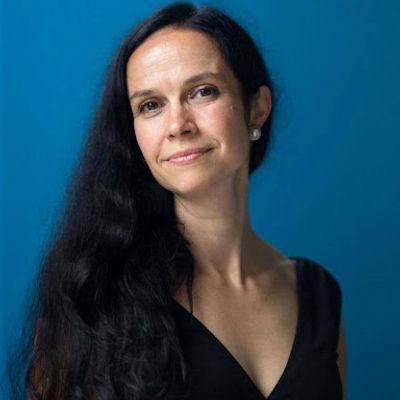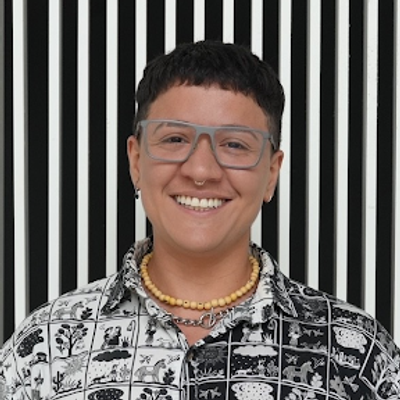Day of Design: Connect
Sep 25, 2025

Bring design into your classroom!
In an era of rapid change, design education equips students with essential skills for navigating uncertainty: critical thinking, clear communication, and adaptive problem-solving. Unlike traditional course material, design introduces the notion that there are many ways to solve or address a challenge, and bridges theory and practice for real-world applications.
At MIT, we work to celebrate and amplify the power of design as a cornerstone of education. MIT students apply design across a wide range of disciplines from biology to engineering, humanities to architecture; with Day of Design, we want to empower young people in K-12 with the same toolkit.
Who is this event for?
This event will bring together teachers and administrators, members of the MIT community, and local design educators to build meaningful relationships and share insights.
Educators: No matter what subject you teach — science, math, history, or beyond — discover how storytelling, iteration, and collaboration can support student learning and career development. Especially relevant to grade 7-12 educators.
Researchers and designers: Members of the MIT community and others working at the intersection of design and education are welcome to share insights and learn from diverse perspectives.
No prior design experience is required — just curiosity about how design thinking can strengthen teaching and learning across all disciplines.
We're curating a thoughtful group. Let us know if you'd like to be considered.
Request to attend
We're curating a thoughtful group
Agenda
An afternoon of connection & exchange for grades 7–12 teachers, out-of-school educators, and the MIT community. We will celebrate the power of design to spark joy, deepen learning, and nurture agency across the curriculum.
1–1:55 PM | Welcoming remarks and panel
Why Design Matters in Non-Design Fields, featuring Sara Brown, Sebastian Lourido, Muriel Médard, and Justin Reich; moderated by Marion Cunningham.
2–3 PM | Workshop Sessions 1
- Storytelling | IDEO, Alien Storytelling
- Iteration | OctoStudio, Explore Your World with OctoStudio
- Collaboration | MIT D-Lab, Teaching Tools for Participatory Design
3:20–4:15 PM | Workshop Sessions 2
- Storytelling | MIT Edgerton Center, Why Our Weather is Getting So Weird
- Iteration | Fab Foundation + MIT Museum, Fab in a Box Balsa Glider
- Collaboration | NuVu Studio, Humans vs. Ants
4:20–4:45 PM | Closing remarks
Transition to Welcome Center, a few steps away!
4:45–6 PM | Community dinner catered by Area Four
Panel Speakers
The day kicks off with a panel featuring creative leaders from STEM and beyond, discussing why design matters outside of traditional design disciplines.

Sara Brown
Set Designer, Associate Professor in Music and Theater Arts
Sara Brown is a set designer and Associate Professor in Music and Theater Arts. Recent projects include The Lehman Trilogy at the Huntington Theater, and The Mother of Us All at the Metropolitan Museum of Art, Fat Ham with the Wilma Theater, and The Other Shore with Jacob’s Pillow which will debut as a VR performance in August of 2021 and as a live installation in the summer of 2022. Her designs have been seen at the BAM Next Wave Festival, the Festival d’automne in Paris and The American Repertory Theater in Cambridge.

Marion Cunningham (moderator)
Managing Director
Originally from Chicago, Marion Cunningham is the managing director for the MIT Morningside Academy for Design. Part of the leadership team, she oversees MAD's finances, human resources, and operations. Prior to joining MAD, she was the director of administration and finance for MIT’s Art, Culture, and Technology program and managing director for MIT’s Center for Real Estate.

Sebastian Lourido
Associate Professor of Biology, MIT
Sebastian Lourido is an Associate Professor of Biology at MIT and a member of the Whitehead Institute for Biomedical Research, where his lab investigates the molecular hallmarks of apicomplexan parasitism.
Lourido grew up in Cali, Colombia, before attending Tulane University in New Orleans, where he earned degrees in Studio Art and Cell and Molecular Biology. He then worked as a research assistant in the laboratory of Arturo Zychlinsky, at the Max Planck Institute for Infection Biology, before returning to the US for graduate school at Washington University in St. Louis. Under the mentorship of L. David Sibley, Lourido started his work on the apicomplexan parasite Toxoplasma gondii, identifying cellular pathways that regulate the parasite’s lytic cycle and earning his Ph.D. in Molecular Microbiology and Microbial Pathogenesis.
In 2012, in lieu of traditional postdoctoral training, Lourido started his own lab as a Whitehead Fellow and was awarded an NIH Director’s Early Independence Award. As a Fellow, Lourido continued working on T. gondii and established the first genome-wide screens for apicomplexan parasites. Lourido was then recruited to his present position where he continues to run a productive research program and co-teaches undergraduate courses in Microbial Pathogenesis and Cell Biology.

Muriel Médard
CEO & co-founder, Spice Solution INC; NEC Professor of Software Science and Engineering; Electrical Engineering and Computer Science, MIT
Muriel Médard is CEO and co-founder of Spice Solution INC and the NEC Professor of Software Science and Engineering in the Electrical Engineering and Computer Science (EECS) Department at MIT, where she leads the Network Coding and Reliable Communications Group in the Research Laboratory for Electronics at MIT and Chief Scientist for Steinwurf, which she has co-founded.
She obtained three bachelor's degrees (EECS 1989, Mathematics 1989, and Humanities 1991), as well as her M.S. (1991) and Sc.D (1995), all from MIT.
Médard is a Member of the US National Academy of Engineering (elected 2020), a Member of the German National Academy of Sciences Leopoldina (elected 2022), a Fellow of the US National Academy of Inventors (elected 2018), American Academy of Arts and Sciences (elected 2021), and a Fellow of the Institute of Electrical and Electronics Engineers (elected 2008). She holds an Honorary Doctorate from the Technical University of Munich (2020) and The University of Aalborg (2022).

Justin Reich
Educational Researcher; Director, MIT Teaching Systems Lab
Justin Reich is an educational researcher interested in the future of learning in a networked world. He is the director of the MIT Teaching Systems Lab, which aspires to design, implement and research the future of teacher learning.
He is the author of Iterate: The Secret to Innovation in Schools and Failure to Disrupt: Why Technology Alone Can't Transform Education from Harvard University Press. He is the host of the TeachLab podcast, and five open online courses on EdX including Sorting Truth from Fiction: Civic Online Reasoning and Becoming a More Equitable Educator: Mindsets and Practices.
Reich is a former fellow and faculty associate of the Berkman Klein Center for Internet and Society at Harvard University.
Workshop Facilitators
Workshop facilitators include experts from MIT D-Lab, the Edgerton Center, Fab Foundation, IDEO, the MIT Media Lab's OctoStudio, MIT Museum, and NuVu Studio.

Diane Brancazio
Instructor, MIT Edgerton Center
Diane is passionate about transforming education within existing traditional schools, helping the students and teachers of today. She supports teachers in becoming facilitators of student-centered hands-on learning, and creating a school culture of experimentation, collaboration, self-direction, and joy in learning.
At MIT, Diane leads the K-12 Maker team which provides resources and PD for teachers integrating Maker/STEM into their regular curriculum, and using Makerspaces to engage and empower students. Her recent collaboration with the MIT Sea Grant lab has led to the creation of Coastal Climate Change Toolkit: A Scientific Framework with Hands-On Experiments.

Jamie Chelel
Jamie Chelel is a classically trained musician, whose conservatory education informs her love of experiential learning, dedication to ongoing discovery, and emphasis on the integration of knowledge and skills. Informed by her time working in informal education and musical ensembles, she believes strongly that collaborative, intergenerational learning experiences open doors to deeper understanding.
Through her work in Maker Education, Chelel hopes to contribute to creating an empowered generation of learners and change-makers who can tackle the big questions of tomorrow with empathy, creativity, and agency.

S.L. (Libby) Hsu
Associate Director of Academics; Lecturer, MIT D-Lab
Libby Hsu graduated from Rensselaer Polytechnic Institute and received master's degrees in structural engineering and building technology from MIT. She became involved with MIT D-Lab by taking the D-Lab: Schools class and traveling to Cambodia to work on alternative concretes.
Now she leads D-Lab's academic program by managing its teaching team, creating and promoting a coherent strategy for D-Lab's academic offerings at MIT, aligning D-Lab's educational mission with its research and practice work around the world, and building instructors' capacity to provide transformative educational experiences to their students.
Libby is also an educator who teaches D-Lab: Water, Sanitation, and Hygiene and D-Lab: Development; coordinates D-Lab's student work in many countries including Mexico, Colombia, and the Dominican Republic; and trains D-Lab trip leaders who are taking students to the field. She has worked with dozens of students on projects related to sanitation, water quality, education, and participatory design; and is also a first-year adviser.
She speaks German and Spanish, has training as a technical editor, and is an avid knitter, as well as a certified Wilderness First Responder. Libby and her husband are the Heads of House at MIT's Random Hall.

Kate James
Head of Product, NuVuX
Kate James is an educator with a background in visual studies and wearable art. She has been developing and implementing makerspace curriculum for over a decade, with a focus on elementary and middle school-aged students.
James is most interested in projects that find unique intersections of materiality, technology, and craft. In her free time she is a competitive martial artist, avid baker, and mom of three kids who make excellent curriculum test subjects.

Heewon Lee
Lecturer, Research Associate; MIT D-Lab
Heewon Lee is an industrial designer and educator deeply committed to utilizing design education for humanitarian and developmental purposes. As a member of the MIT D-Lab Humanitarian Innovation team, Heewon focuses on designing and managing projects aimed at enhancing creative capacity among youth in low-resource settings.
Currently, Heewon is dedicated to exploring the potential applications of repurposed electronic devices in various developmental sectors, including agriculture, education, health, and energy. Through collaborative efforts with community innovators in northern Uganda's refugee camps and rural areas of Tanzania, he strives to co-design solutions that improve local technologies and positively impact businesses and lives.
Originally from South Korea, Heewon completed a master's degree in Interaction Design at the Umeå Institute of Design and later engaged in PhD coursework at the Korea Advanced Institute of Science & Technology (KAIST). Throughout his career, he has been involved in diverse projects encompassing product design, interaction design, and graphic design.
Heewon shares his expertise as a lecturer at the Massachusetts Institute of Technology (MIT) and the Rhode Island School of Design (RISD), teaching courses such as Mobiles for Development (MIT D-Lab), Product Design and Development (MIT Sloan School of Management), Humanitarian Innovation Design (RISD), and MIT Studio (RISD). Outside of his professional endeavors, Heewon enjoys rock climbing and restoring automobiles in his leisure time.

Andy Reischling
Writing and Strategy Lead, IDEO
Andy Reischling is a writer and strategist at IDEO. He has helped launch the first truly global self-care brand with Bollywood’s biggest star, published essays on topics ranging from productive friction and search modalities to information architecture, poetry, and listening, and presented on the intersection of design and jiu jitsu. His work spans brand strategies, campaigns, and product launches and redesigns for Fortune 50 companies.
Andy often employs unconventional methods—setting shoes on fire, dropping cement blocks off buildings, or singing H-Town’s “Emotions” to a room full of executives—to spark creativity. He partners with clients exploring new directions, combining copywriting, storytelling, brand and product strategy, UX and content design, and user research to produce rigorously creative work that drives top-line growth.

Téo Xisto
Creative Learning Coordinator, Lifelong Kindergarten research group, MIT Media Lab
Téo Xisto (they/them) is the Creative Learning Coordinator at the Lifelong Kindergarten research group. Xisto is also a graduate of the group, where they researched learning environments that foster critical consciousness. They now help develop learning resources, workshops, videos, and partnerships to foster caring and creative communities around the world.
Partners
Day of Design offers events, professional development (PD) opportunities, and a growing set of free, open-source design activities for every classroom. It is inspired by Day of AI and Day of Climate.
This event is presented by the MIT Morningside Academy for Design (MAD) and the MIT Museum, with support from WPS Institute, and the MIT pK-12 Initiative.
Professional Development
This event is eligible for Professional Development Points (PDPs) in Arts, Mathematics, and Science & Technology/Engineering (grades 7–12) when combined with additional PD hours. If you'd be interested in PDPs, please note this on the form and we'll follow up with more information.
Next Steps
October 2025 to March 2026
Following this event, we will work with a cohort of 8-10 Boston-area teachers from October to March to make the six workshops from the kickoff event classroom-ready. Applications for TIF will be launched at the Fall Event.
March 2026
This free, open-source material will be released in March of 2026 to support a real-world challenge.
March 2026 to June 2026
We imagine teachers will do workshops on Collaboration Storytelling, and Iteration as a way of teaching those skills explicitly and then dive into the real-world challenge released in March.
June 2026 or July 2026
Student projects from the challenge will be presented at an event in summer 2026 judged with an emphasis on their process, and how well they engage in the session themes.
Accessibility
Our events are enriched by your presence and we are committed to making them accessible to everyone.
Please email us at [email protected] to request accommodations.